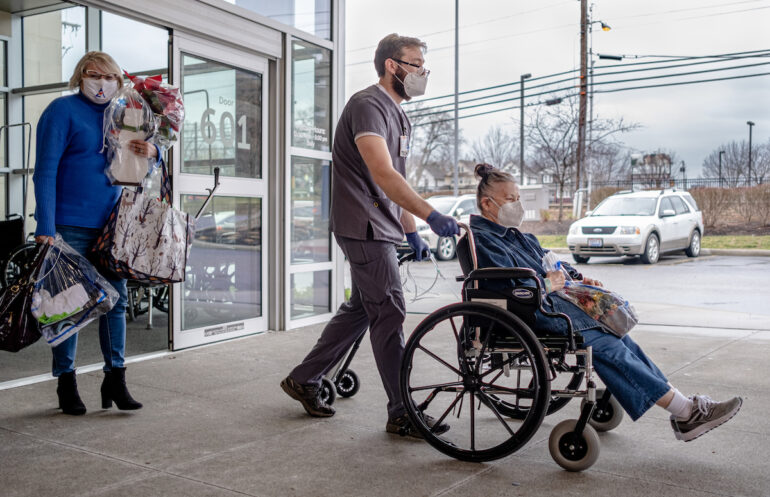Leighann Fink lost her bid for county recorder, then faced the prospect of losing her mother to Covid-19
Mary Ann Poplaski gasped for breath atop the stairs at her daughter’s home in Kent. She had ventured from her bed, where she spent much of the previous week battling Covid-19, to help her grandson in the bathroom in the middle of the night. She could barely make it out of her room. Her upper lip was turning blue as she called for help.
“We almost lost my mom,” said Poplaski’s daughter, Leighann Fink. “We were lucky.”
Fink called an ambulance. Poplaski had been to Akron City Hospital’s emergency room twice already in the last week, but she was sent home both times because the hospital’s Covid-19 ward was nearing capacity, Fink said. Getting her mother admitted to a hospital seemed impossible, she said. She negotiated with doctors, telling them her mother would die without proper medical attention.
By the time the ambulance came, Poplaski’s blood oxygen level returned to normal, she caught her breath and the ambulance left empty.
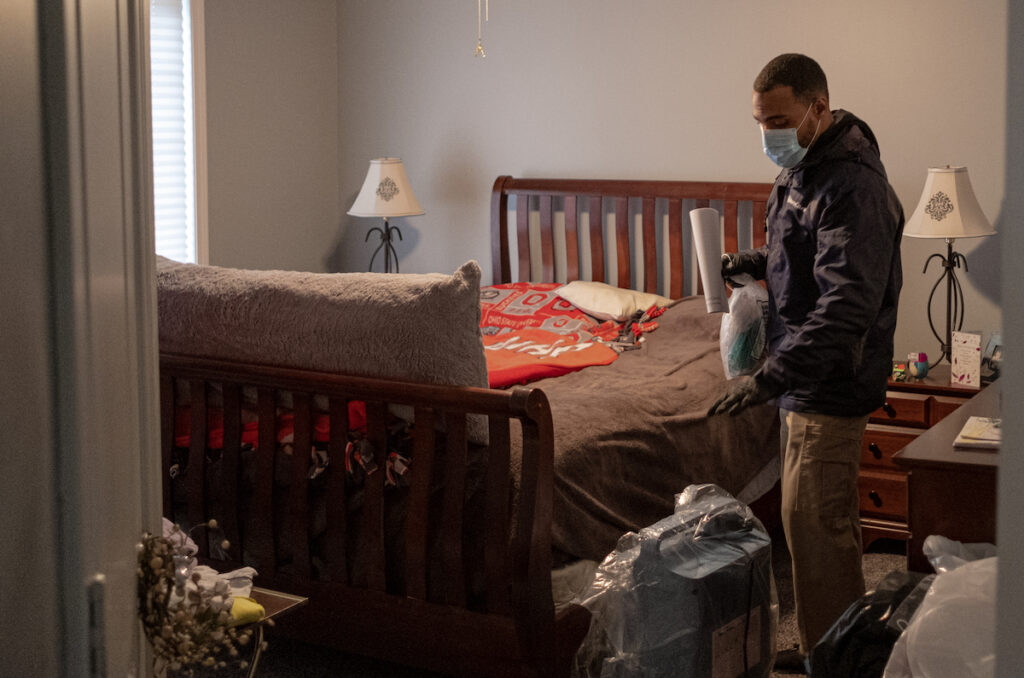
Fink’s family faced Covid-19 like so many others have, with masks and social distancing, yet three people in the family grew ill last November, right around Thanksgiving. Fink and her father Leon Poplaski both weathered mild Covid-19 symptoms and bounced back without any issues, but Mary Ann Poplaski’s symptoms worsened.
At that point, the pandemic had not only affected Fink’s family, but her political career as well. Fink had just lost the race for Portage County recorder weeks before she got sick. Although she enjoyed campaigning, she wished she could have met more people in person and held more events, she said.
Before her campaign even began, Fink looked forward to meeting more Portage County citizens through it. She moved to Kent in 2012, knowing only her husband, Eric Fink, at the time. She viewed her campaign as a way to more actively engage with her community and expected to connect with voters at large events and parades.
“I had never run for anything in the past,” she said. “The thought that was in my head really was: I’m not from here, and people really don’t know me. How am I going to bypass that impediment and connect with people?”
But before her campaign even began, Ohio Gov. Mike DeWine announced a stay-at-home order on March 22, 2020, following rising Covid-19 case numbers in the state. Restrictions remained in place for the rest of the year.
“I’m very much a people person, so had Covid not been in place, I think that I would have been able to meet a lot more Portage County citizens than I was able to,” she said. “The opportunities to really get to know people were not there.”
But Fink took the pandemic on the chin and turned to social media. She enjoyed connecting with people virtually, she said, but even social media couldn’t reach as many people as she would have liked.
Throughout the summer, Fink and her family participated in a series of pop-up food pantries sponsored by the Portage County Democratic Party to help alleviate the pandemic’s economic strain on families throughout the county.
“I felt like, instead of doing parades and buying candy and spending the money on things that people didn’t actually need, we were able to actually impact real families,” Fink said. “That was important to us. We felt committed to that.”
She held some campaign events, at which her husband and 5-year-old son Sammy Fink were staples. Working around the pandemic, they wore masks and held their events outside, one time giving out cookies at a drive-thru style event.
But the unpredictable nature of the pandemic sometimes threw a wrench in her plans. In the fall, Fink had planned to hold a small live concert at her Kent home. She wanted to give her community something positive, something to remind them of what life was like before the pandemic. Then Portage County went into the red on Ohio’s public health advisory system. The violinist performed nonetheless, albeit for a virtual audience via Zoom.
Regardless of the pandemic and her election loss, Fink reflected fondly on her campaign, saying she wouldn’t change anything about it.
“I really loved every minute of it. I enjoyed the opportunity, even if it was through social media, to get to know more people, talk to them, answer questions for them, bounce off ideas.”
She treasured the time spent with her family at campaign events, noting that she was able to demonstrate to her son the importance of community engagement.
“Sammy was with us every step of the way,” she said. “I feel it really enriched him. He learned a lot. He also saw that I put myself out there. I wasn’t successful in the end result, but that wasn’t a reason not to try. I feel like that’s such a good lesson for a child to learn.”
But within weeks of losing her race for county recorder, Fink faced the possibility of losing her mother to the virus she’d just spent months planning around.
“Had she stayed home one more day or had they refused to keep her she’d be dead,” Fink said. “No doubt.”
Originally from Pennsylvania, Leon and Mary Ann Poplaski had been staying with their daughter in Kent since August. Leon Poplaski needed a heart valve replacement at Akron City Hospital, and as he was recovering, he and his wife decided to stay in Kent for the coming holidays.
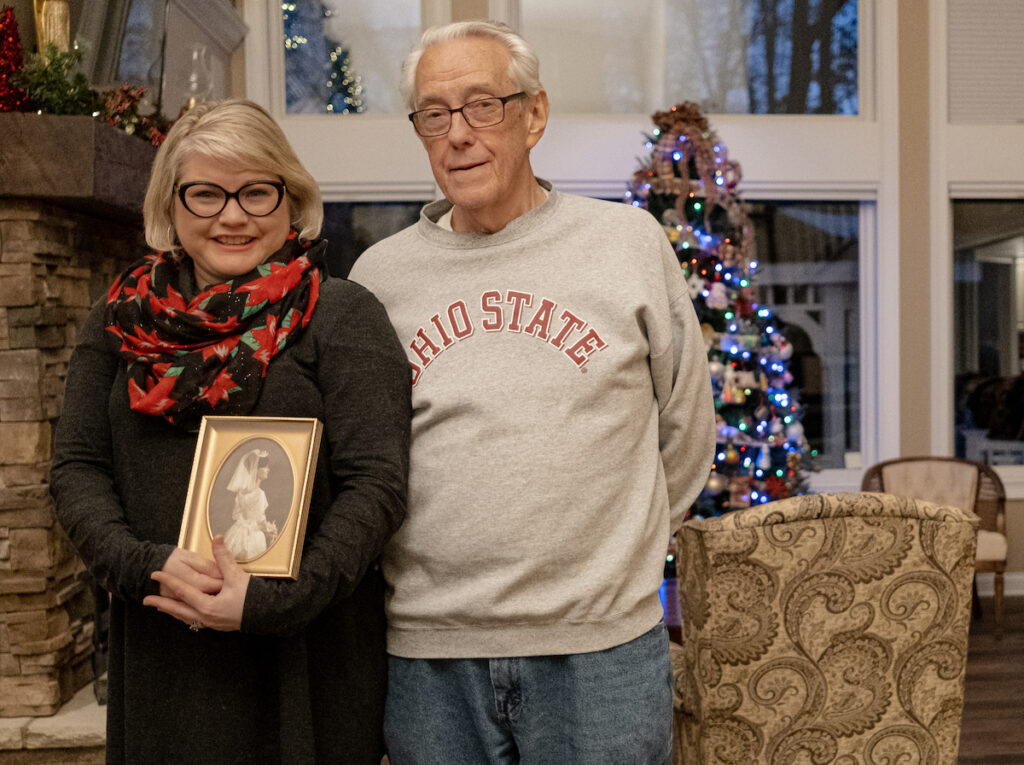
Then, they were exposed to Covid-19, unsure of where or how, and fell ill in the weeks before Thanksgiving. Fink and her father caught it first, developing flu-like symptoms that faded fairly quickly. The whole family quarantined in different rooms in the home, but Mary Ann Poplaski developed symptoms around Nov. 13 while her husband and daughter were recovering.
Fink took her mother to Akron City Hospital a few days later, where she was given some minor treatment and sent home. Poplaski spoke with a nurse while she was being treated. She said the nurse told her the Covid-19 wing was reserved for those with the most acute symptoms.
“She told me not to come back and go upstairs [to the Covid-19 wing] because maybe I’ll never come out of there,” Poplaski said.
Two days later, Fink called an ambulance to take her mother into Akron City Hospital because she had fallen twice and was severely dehydrated. Her blood oxygen level fell to about 80 percent. After fluids and a chest X-ray, the nurse told Fink that her mother would be safer at home because the Covid-19 wing had people with diseases like pneumonia in it.
Then came the night Poplaski lost her breath on the stairs. Although the ambulance didn’t take her in that night, her blood oxygen level remained low, about 70%, for the next day, and her condition deteriorated. Fink called the hospital again, urging a primary care doctor to redo her mother’s blood work and X-rays.
The hospital admitted her this time. They had to be absolutely sure she couldn’t survive outside the hospital because resources and space were limited, Fink said. Even then, Poplaski waited in the emergency room for about 12 hours for a Covid-19 treatment room.
“I’ve obviously been angry that she wasn’t admitted and that it got so bad for her,” she said. “Then I just felt a lot of grief. … The day that she was admitted and had to be moved to the ICU, the doctor called me and said, ‘Does she want all life saving measures?’ They were basically telling me that it didn’t look good, and they asked me if I would want her intubated. I said yes, and then the doctor said, ‘Well, you know that patients don’t do well when they’re intubated and they have Covid.’ And I said, ‘I understand that, but isn’t the other option that she’ll die?’ The doctor said, ‘Yes.’”
Poplaski was terrified. As she waited in the emergency room, she flashed back to her conversation with the nurse from her first visit.
“She was literally begging me not to send her,” Fink said. “She was saying, ‘If I go, I’ll never come back. if you send me, I’ll never come back. I’ll never get out of there. I’ll never get out of there.’ That’s what she believed.”
Fink and the nurses and doctors reassured Poplaski as she began treatment. She was put on oxygen and given plasma and Remdesivir, a prescription drug used to treat Covid-19. She had developed pneumonia so doctors gave her antibiotics and a steroid. Had she needed a greater amount of oxygen than she was given, she would have to be intubated.
Family and friends outpoured support for the Fink family while Poplaski was hospitalized. Sammy’s class handmade cards for her, and friends brought over “enough breakfast to feed 15 people,” Fink said. Poplaski remained on edge as her condition stabilized, then gradually improved.
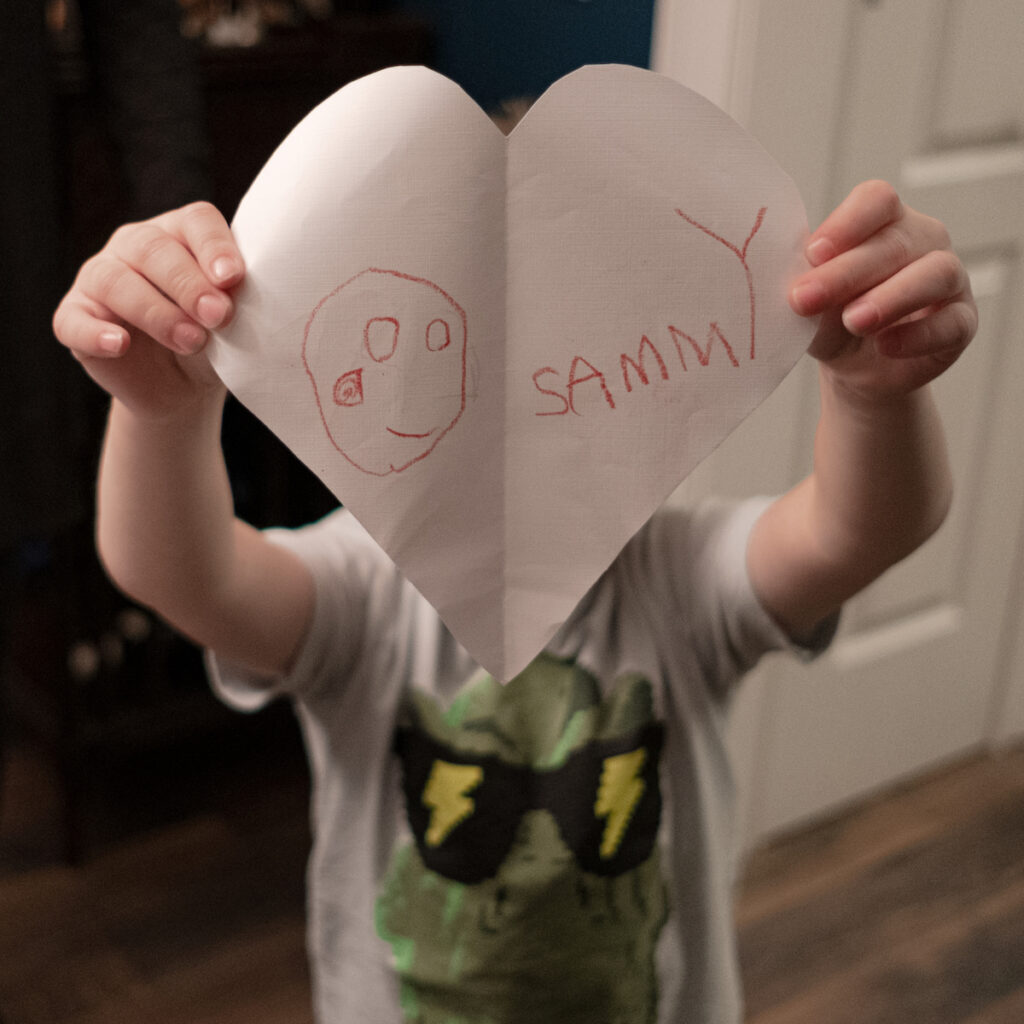
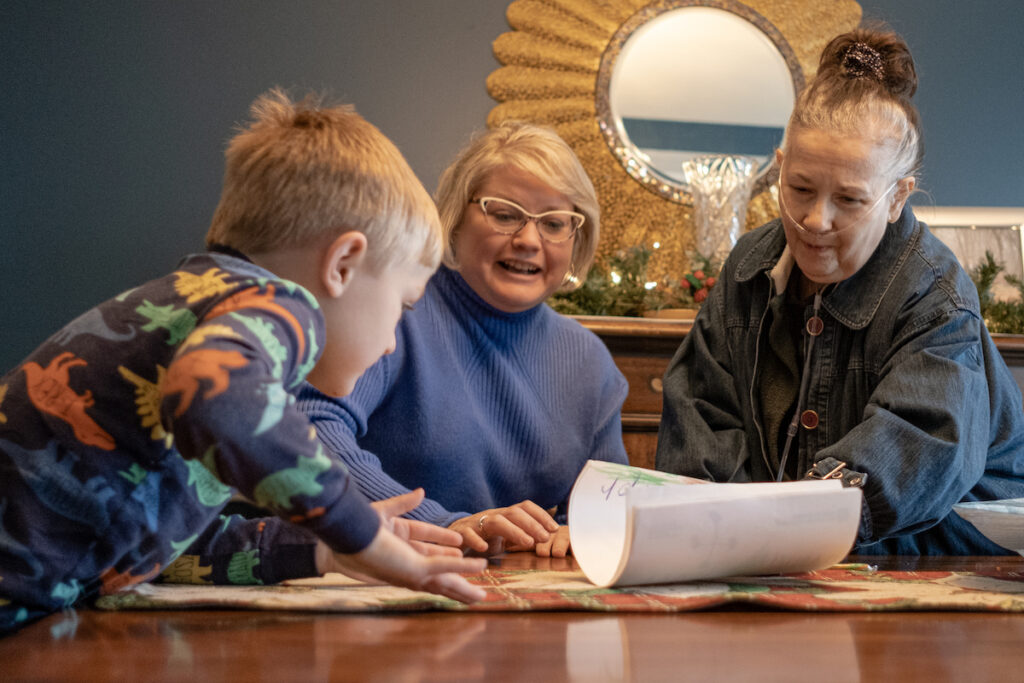
“Every day, I would think to myself, ‘Am I gonna get home? Am I gonna get home?’” Poplaski said. “It was tough, you know? You don’t have family around, and you have this problem. You see some people dying. It’s kinda tough.”
The speaker on her flip phone provided her only means of directly communicating with her family. She could see them only through pictures Fink sent her. Fink and her family brought her Thanksgiving dinner and Christmas decorations for her room, but they could only drop these items off at the hospital’s front desk. They couldn’t visit her, but after a few weeks at Akron City Hospital, she was transferred to rehabilitation, where she gradually weaned to lower flow oxygen.
After just barely avoiding intubation, Poplaski was going to pull through.
“When they came and said, ‘This is it, you can go home,’ it’s just such a wonderful feeling,” she said. “I just feel that I wish other people would really understand how difficult this can be.”
She saw her daughter for the first time in nearly a month on the cloudy afternoon of Dec. 12. With arms full of flowers and gifts from her mother’s room, Fink followed Poplaski as a nurse escorted her out of the hospital in a wheelchair. The nurse helped lift her and her oxygen tank into the car as she beamed. Having been stuck inside for nearly a month wondering whether she’d survive, breathing in fresh air was a blessing, she said.
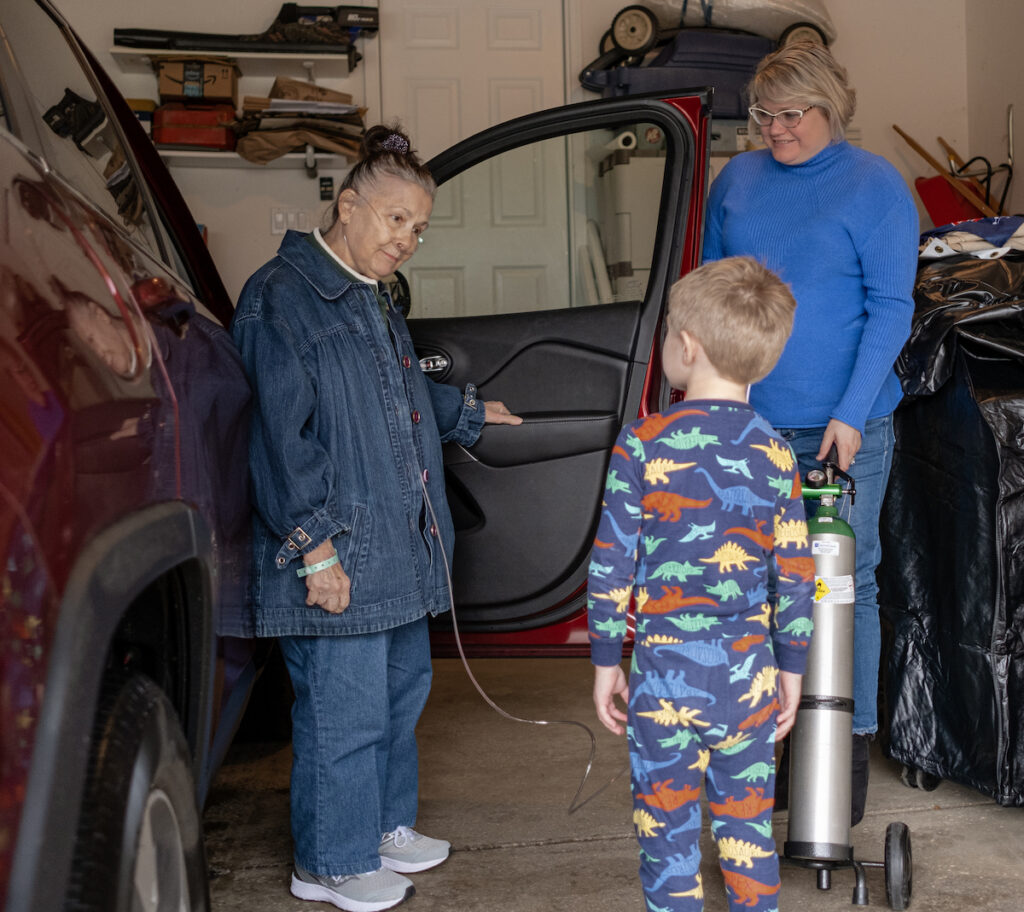
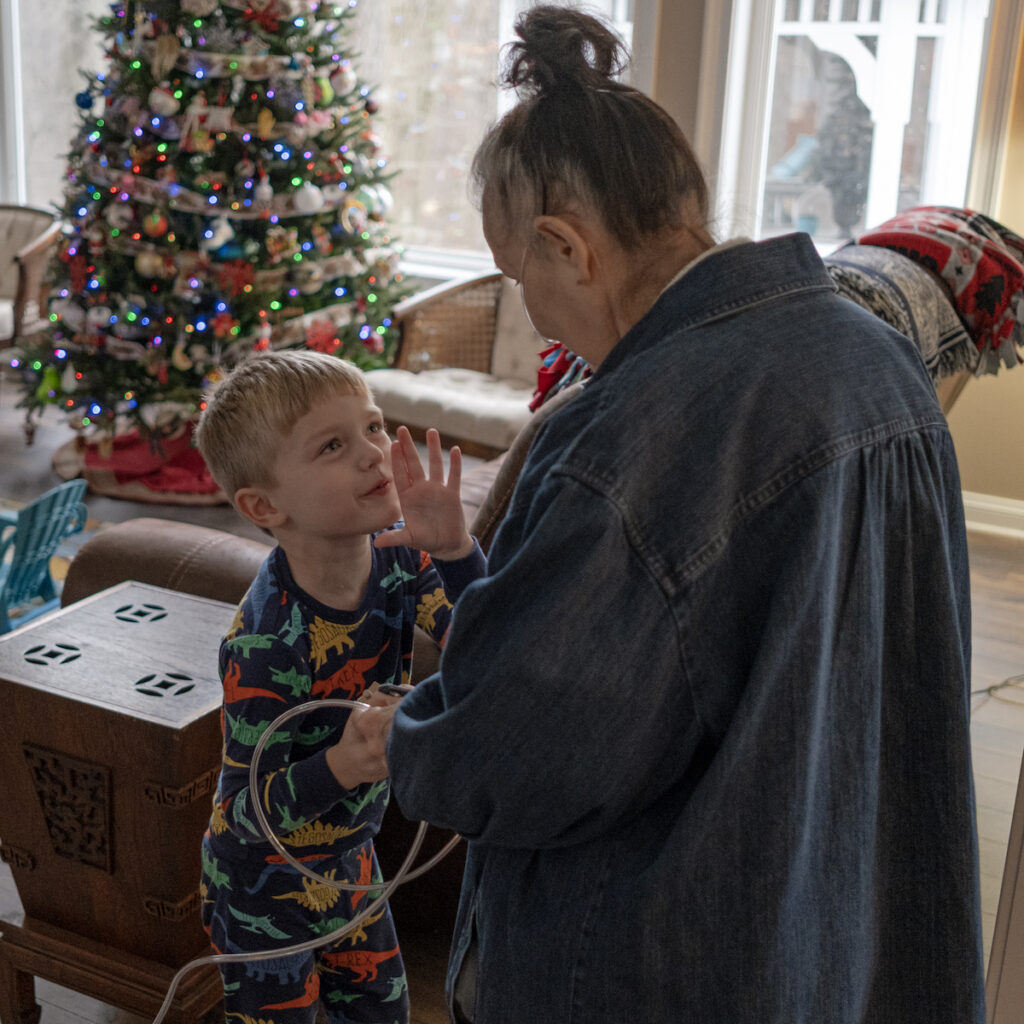
She has no shortage of fresh air now. She recovered without any long-term side effects. As of March, Mary Ann, Leon Poplaski and Fink all received their first dose of Covid-19 vaccine. Looking back on her family’s battle with the virus, Fink noted simply: “It is tragic. It is heartbreaking. It is absolutely 100% real.”
She felt blessed to have the means and access to resources that saved her mother’s life.
“If you don’t have somebody fighting for you on the outside trying to make sure you’re getting the best care, I think that it’s an uphill battle for a lot of people, especially maybe older people or people that might not have the same resources or have somebody be able to,” Fink said. “I took two weeks off from work. I had to take the emergency Covid leave. That’s not available to everyone.”
Being treated for Covid-19 during this time wasn’t as simple as walking in the hospital and asking for a prescription, she said. Hospitals had been reserving those resources for only those who undoubtedly needed them. Fink and her parents all emphasized that the virus should not be taken lightly.
But through all the confusion and frustration, Poplaski’s family stood by her, cheering on her recovery.
“Through crisis, you get closer as a family,” Fink said. “You lean on each other.”

